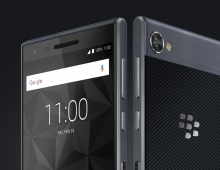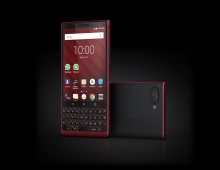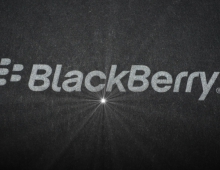
Blackberry To Release 'Priv' Android Phone
Blackberry CEO today confirmed that the company plans to release its first Android smartphone, called "Priv", sometime next year. The company confirmed plans to continue to develop and enhance the BlackBerry 10 operating system. "..we are focused on making faster progress to achieve profitability in our handset business. Today, I am confirming our plans to launch Priv, an Android device named after BlackBerry’s heritage and core mission of protecting our customers’ privacy. Priv combines the best of BlackBerry security and productivity with the expansive mobile application ecosystem available on the Android platform," said Blackberry Executive Chairman and Chief Executive Officer John Chen.
The flagship slider device will run on the Android operating system, bringing together elements from the BlackBerry security and productivity with the expansive mobile application ecosystem available on the Android platform.
In combination with BlackBerry’s efforts to support Android for Work on the BES12 platform, the new device has been designed to offer increased security for enterprise users.
BlackBerry expects the device to be available late in the calendar year in major markets in-store and online, and plans release further details in the coming weeks.
Besides the new smartphone, the company remains committed to the BlackBerry 10 operating system, which enables security and productivity benefits.
Chen said that Blackberry will continue to develop and enhance the BlackBerry 10 operating system and confirmed plans to release platform updates focused on security and privacy enhancements, with version 10.3.3 scheduled to be available in March 2016.
On September 4, BlackBerry announced it had entered into a definitive agreement to acquire Good Technology for 425 million in cash. The acquisition is aligned with BlackBerry’s strategy to offer its customers complete, end-to-end solution that secures the entire mobile enterprise, across all platforms.
Good will bring complementary capabilities and technologies to BlackBerry, including secure application management and containerization that protects end user privacy – with the majority of its activations from iOS devices.
The transaction is expected to close toward the end of the company’s 2016 fiscal third quarter and is subject to customary closing conditions, including regulatory approvals.
On September 22, BlackBerry also closed its acquisition of AtHoc,
a provider of secure, networked crisis communications for $250 million
in cash.
AtHoc’s platform alerts any device – including iOS, Android, PC and Mac desktops, digital displays, radios, IP phones, and endpoints such as sirens, fire panels and speakers – helping organizations and people to connect and share information in times of crisis.
"I am confident in our strategy and continued progress, highlighted by our fourth consecutive quarter of year-over-year double digit growth in software licensing revenue and sixth consecutive quarter of positive free cash flow," said John Chen. "In order to expand our leadership in cross
-platform software and services, we are investing strategically –
organically through new products and services based on the BES platform, and through acquisitions like AtHoc and Good."
"From these initiatives, we anticipate modest sequential revenue growth in each of the remaining quarters of fiscal 2016," he added.
Q2 Results
BlackBerry on Friday reported a bigger-than-expected second-quarter loss on Friday, as revenue from its once-iconic smartphone slid further.
Excluding one-time items like a non-cash credit tied to the value of debentures and restructuring charges, the Waterloo, Ontario-based company reported a quarterly loss of $66 million, or 13 cents a share.
In the period ended Aug. 29, it earned a net profit of $51 million. That compared with a loss of $207 million a year earlier.
Revenue fell 46.5 percent to $490 million in the quarter. The revenue breakdown for the quarter was approximately 15% for software and services, 41% for hardware, and 43% for service access fees (SAF).
BlackBerry had 2,400 enterprise customer wins in the quarter.
Approximately 60% of the licenses associated with these deals were cross
-platform.
During the second quarter, the company recognized hardware revenue on
over 800,000 BlackBerry smartphones with an ASP of approximately $240.





















